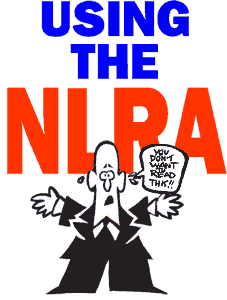
Issues
- Stewards need all the information we can get to effectively represent the members
- One sometimes overlooked source of information is management
- The National Labor Relations Act (NLRA) gives us the right to ask for (and receive) the information we need from the boss to effectively represent our members.
A member has a grievance. We talk to co-workers, witnesses and anyone else who might have relevant information. But we sometimes overlook records and documents from our employer as another good source of information.
It happens to every steward. A member comes to you with a grievance that raises far more questions than it answers. Let’s say they were passed over for a job in favor of a shorter service employee. The boss said it was a matter of qualifications. What now?
Obviously lots of things need to be checked out. Who got the job and what qualifications and seniority do they have? Do we have a copy of the posting or the job description? Who successfully bid to this job in the past and how qualified were they? Were there other applicants? Did everyone get interviewed and if so were notes kept? Does the supervisor have a history of favoritism? Is there some contract negotiating history that has some bearing on the case?
Getting Information
Having good and complete information is vital in fighting grievances. But where and how do we get it?
First we should look to ourselves. An informed steward not only knows the contract, but the past practices of the department. A wealth of knowledge exists among the members as well. And of course the local union should keep records. But sometimes that still isn’t enough to be properly prepared.
Help can come from an unexpected source—the employer! It’s not because they want to provide information. The union is entitled to it under the National Labor Relations Act (NLRA).
Information and the Law
In the 60 years since it was passed in 1935, anti-labor amendments and court decisions have greatly weakened the NLRA. Nevertheless the law still requires employers to provide information to the union that the employer has or can reasonably obtain, provided that the information requested is relevant or useful to the union in bargaining. Bargaining includes not only contract negotiations, but applies to grievances as well. Employers refusing to supply such information may be subject to unfair labor practice complaints.
The steward may request information:
- Before a grievance is filed to see if the contract may have been violated.
- At or between any step of the grievance procedure.
- After the final step to prepare for or consider a possible arbitration case.
It’s best to be specific about what we want and, unless the information is immediately available, to put the request in writing.
Remember, the information must bear some relevance to the actual or potential grievance. The union is not allowed to use requests merely to conduct a "fishing expedition" through company records. Nevertheless all sorts of company documents data and factual information are fair game (see list below). There have even been cases where the boss has "thrown in the towel" on a grievance rather than go to the trouble of digging up the information requested.
A Word of Caution
Even the best information doesn’t mean the grievance will be won. The boss can, and often does, say no, particularly when the members are not involved and prepared to exert pressure. The steward who neglects to involve the membership while waiting for the boss to supply information risks losing the best chance to settle a case satisfactorily. Using our rights under the NLRA is a useful exercise if it helps us to get membership involvement. It is however no substitute for that involvement.
